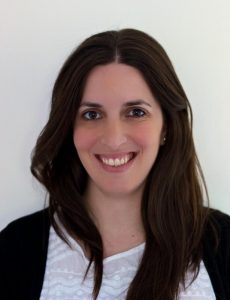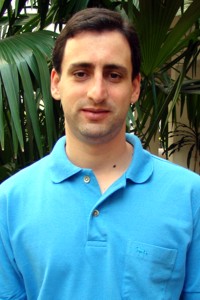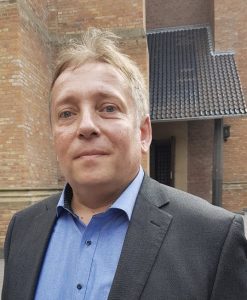Keynotes
Paloma de la Puente
Universidad Politécnica de Madrid, Spain
November 22nd, 2023

Paloma de la Puente received her engineering degree in Automatic Control and Electronics, her M.Sc., and Ph.D. in Robotics and Automation from Universidad Politécnica de Madrid (UPM), in 2007, 2008, and 2012, respectively. She was a Predoctoral Visitor at Caltech for two + three months. She was a Postdoctoral Researcher at DISAM-UPM for six months and at the ACIN Institute of Automation and Control-Vienna University of Technology (TUW) for two years. She also had professional experience with Ixion Industry and Aerospace, as senior robotics engineer specialized in vehicle localization. She is currently an Assistant Professor with UPM. Her current research interests include mobile robots navigation, localization, mapping, SLAM, spatial cognition, sensor data processing, human-robot interaction for service robotics, and systems engineering. She has wide experience in these areas and has worked on many different systems for different kinds of applications. She has participated in several national and European projects and also in international robotics competitions. She has authored 19 Journal articles and 2 Editorials. She has participated in the organization of conferences and workshops at international level and has been Associate Editor of IEEE RA-Letters for three years. She currently serves as Secretary of UPM’s PhD program on Automation and Robotics and participates in the DIH – AIR4S (Digital Innovation Hub in Artificial Intelligence and Robotics for Sustainable Development Goals).
Understanding the environment and the users: towards mobile robot navigation and interaction in the real world.
Despite the impressive advances in many areas of mobile robot navigation, robust autonomous operation still faces significant challenges for many real applications. Widely recognized aspects to be improved are related to robustness and task oriented perception. These research problems require complex theoretical work as well as practical testing and discovery. Understanding the environment, the user and the relations between them is not easy, and there are many issues that experiments in controlled settings and labs cannot reveal. What if the robot should be precisely positioned with respect to an object? If there is a user involved, a flexible approach may be preferred. What if the environment changes? What if the user believes that the system is working properly when it is not? And the other way around?
This invited talk will provide an overview of the limitations in the current State of the Art and promising works addressing them. I will present my experiences in several projects, focusing on practical lessons learned in a) drone inspection for airplane maintenance and b) assistive robots for elderly users in their own homes. While each application presents its own particularities, most of the presented ideas could be easily adapted to other scenarios and configurations.
Denis Fernando Wolf
University of São Paulo, Brazil
November 23rd, 2023 – Morning

Denis Fernando Wolf is an Associate Professor in the Computer Systems Department at the University of São Paulo, where he is the founding director of the Mobile Robotics Laboratory. Professor Wolf received his BSc degree in Computer Science from Federal University of Sao Carlos (Brazil) in 1999 and the PhD degree in Computer Science from the University of Southern California (USA) in 2006. His main research interest is the development of robotic systems for field operations. Most of his current work focuses on computer vision, sensor fusion and machine learning applied to autonomous robots and vehicles for urban, agricultural and mining applications. He has co-authored over 100 papers in peer- reviewed journals and conference proceedings, served as Program Chair of the International Conference on Intelligent Transportation Systems (ITSC) in 2016, and is currently Associate Editor of the IEEE Transactions on Intelligent Transportation Systems.
Intelligent Vehicles: from autonomy to interaction
Intelligent vehicles have received considerable attention in recent years. Despite relevant advances in the last two decades, there are still challenges and open questions to be addressed in this area. This talk presents research results on intelligent vehicles that range from basic software components to algorithms for intention prediction and traffic negotiation.
António Pedro Aguiar
University of Porto, Portugal
November 23rd, 2023 – Afternoon

Pedro Aguiar received the Licenciatura, M.S., and Ph.D. degrees in Electrical and Computer Engineering from the Instituto Superior Tecnico (IST), University of Lisbon, Portugal, in 1994, 1998, and 2002, respectively. Currently, Dr. Aguiar is a Full Professor with the Department of Electrical and Computer Engineering (DEEC), Faculty of Engineering, University of Porto (FEUP). He is also Director of ARISE – Advanced Production and Intelligent Systems Associate Laboratory, Scientific Coordinator of SYSTEC – Research Center for Systems and Technologies, and Head of Cyber-Physical Control Systems and Robotics lab (C2SR). From 2002 to 2005, he was a Postdoctoral Researcher in the Center for Control, Dynamical-Systems, and Computation, University of California, Santa Barbara, CA, USA. From 2005 to 2012, he was a Senior Researcher with the Institute for Systems and Robotics and an invited Assistant Professor in the Department of Electrical and Computer Engineering at IST, Lisbon. His research interests are in the area of Signals, Control Systems and Robotics (theory and applications) with particular focus on motion planning, guidance, navigation and control of single and multiple autonomous robotic vehicles, nonlinear control and estimation theory, machine learning and the integration of machine vision with feedback control, perception systems, networked control and cyber-physical systems, large-scale distributed systems, optimization based and optimal control, quantum systems, and reinforcement learning. He has been participating in several R&D national and international projects in the area of Autonomous Vehicles, and is currently Editor of the journals IFAC Automatica (AE), IEEE Control Systems Letters, and IEEE Transactions on Vehicular Technology.
Model based control design combining Lyapunov and optimization tools to empower trusted autonomy of robotic vehicles
The past few decades have witnessed a significant research effort in the field of Lyapunov model based control design. In parallel, optimal control and optimization model based design have also expanded their range of applications, and nowadays, receding horizon approaches can be considered a mature field for particular classes of control systems.
In this talk, I will argue that Lyapunov based techniques play an important role for analysis of model based optimization methodologies and moreover, both approaches can be combined for control design resulting in powerful frameworks with formal guarantees of robustness, stability, performance, and safety. Illustrative examples in the area of motion control of autonomous robotic vehicles will be presented for Autonomous Underwater Vehicles (AUVs), Autonomous Surface Vehicles (ASVs) and Unmanned Aerial Vehicles (UAVs).
Sven Behnke
University of Bonn, Germany
November 24th, 2023

Prof. Dr. Sven Behnke holds since 2008 the chair for Autonomous Intelligent Systems at the University of Bonn and heads the Computer Science Institute VI – Intelligent Systems and Robotics. He graduated in 1997 from Martin-Luther-Universität Halle-Wittenberg (Dipl.-Inform.) and received his doctorate in computer science (Dr. rer. nat.) from Freie Universität Berlin in 2002. In his dissertation “Hierarchical Neural Networks for Image Interpretation” he extended forward deep learning models to recurrent models for visual perception. In 2003 he did postdoctoral research on robust speech recognition at the International Computer Science Institute in Berkeley, CA. In 2004-2008 Professor Behnke led the Emmy Noether Junior Research Group “Humanoid Robots” at Albert-Ludwigs-Universität Freiburg. His research interests include cognitive robotics, computer vision, and machine learning. Prof. Behnke received several Best Paper Awards, three Amazon Research Awards (2018-20), a Google Faculty Research Award (2019), and the Ralf-Dahrendorf- Prize of BMBF for the European Research Area (2019). His team NimbRo has won numerous robot competitions (RoboCup Humanoid Soccer, RoboCup@Home, MBZIRC, ANA Avatar XPRIZE).
From Intuitive Immersive Telepresence Systems to Conscious Service Robots
Intuitive immersive telepresence systems enable transporting human presence to remote locationsin real time. The participants of the recent ANA Avatar XPRIZE competition developed robotic systems that allow operators to see, hear, and interact with a remote environment in a way that feels as if they are truly there. In the plenary, I will present the competition tasks and results. My team NimbRo won the $5M Grand Prize. I will detail our approaches for the design of the operator station, the avatar robot, and the software. While telepresence enables a multitude of applications such as telemedicine and remote assistance, for other scenarios autonomy is required. In the second part of my presentation, I argue that consciousness is needed to adapt quickly to novel tasks in open-ended domains and to be aware of own limitations. I will present a research concept for developing conscious service robots that systematically generalize their knowledge to cope with novelty and that monitor themselves to obtain more information when needed, to avoid risks, and to detect and mitigate errors. This new generation of robots has much potential for numerous open-ended application domains, including assistance in everyday environments.
Important Dates
| Special Session Proposal submission: | 30 May 2023 |
| Paper Submission Deadline: |
24 July 2023 |
| Notification of Acceptance: |
18 September 2023 |
| Submissions of Project Posters and Late Results: | 30 October 2023 |
| Notification of Project Posters and Late Results: | 15 October 2023 |
| Camera-ready: | |
| Early Registration: | |
| Conference: | 22-24 November 2023 |

